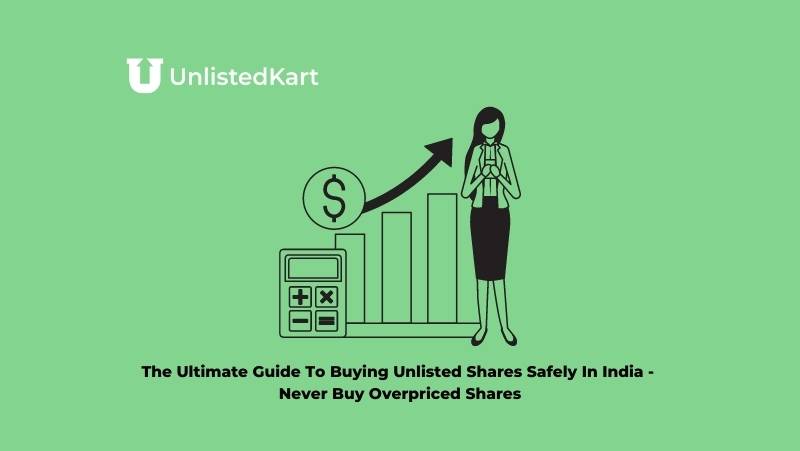If you’re nervous about investing in unlisted shares, don’t worry! We have a few game-changing tips to help protect you from booking unnecessary losses.
But First,
What’s The Difference Between Listed & Unlisted Shares

There are two types of shares that you can buy on the stock market: Listed and Unlisted. The listed stocks come with a safety net through constant monitoring by SEBI, while unlisted ones provide opportunities for growth but also carry risks not seen before like lesser regulations.
If such high-growing opportunities pique your interest, this blog will help you understand how to buy unlisted shares of a company.
Unlisted shares, also known as over-the-counter (OTC) securities, are any security or financial instrument that is available for trade on over-the-counter markets.
Unlisted companies like CSK, BYJU’s often have to go through a lot more than their listed counterparts.
They can’t just list themselves on some stock exchange and be done with it – they need requirements like listing fees, as well as meet minimum market capitalization standards set by law.
Unlisted Financial Instruments: What Are They?
The common stock is one of the most prevalent types of unlisted financial instruments. These stocks are traded on OTC markets, which means they’re not publicly listed for anyone to invest in.
Among the other instruments are:
- Penny stocks
- Corporate bonds
- Government securities
- Derivative products like swaps, etc.
What is the best way to invest in unlisted companies?
You can invest in stocks of some of India’s top unlisted companies like BoAt, CSK, and Reliance Retail Limited in a variety of ways.
Among the most popular methods are:
Investing in new businesses and intermediaries
The shares of a pre-IPO company are delivered to your Demat account the moment you buy them, even if that transaction happened off-the-record and without any involvement from an exchange.
When dealing with an intermediary, the most important thing to keep in mind is that they should be able to successfully help you close your transaction while avoiding any counterparty risks.
Alternatively, you can invest in unlisted start-ups with the potential for multi-fold growth in the future. These companies may be off the radar right now, but they have the potential to bring profits and growth in the future. The minimum investment amount in most start-ups is around Rs 50,000 to get the stocks transferred into your Demat account.
Buying stocks directly from promoters
To invest a significant stake in a company, contact a reputable investment bank, wealth manager, or broker who can teach you how to calculate the share price of an unlisted company.
Furthermore, they will assist you in directly connecting with the company’s promoters and will introduce you to a list of unlisted companies in India.
Buying ESOPs directly from employees
The share purchase plan is one way to invest in India’s top unlisted companies. Some brokers connect you with employees of organizations who sell their shares at a predetermined price after a set period of time, this method can be used by anyone looking for an easy way into these valuable assets.
Invest in PMS and AIF funds that buy unlisted stocks.
Portfolio management systems, also known as PMSs are professionally managed investment portfolios that optimize their investor’s returns through changes in weight and composition based on market trends.
You can benefit from investing in unlisted shares in India through PMS schemes that include unlisted shares in their investment strategy. This is far more secure than direct purchase because:
1) You can spread the risk across the portfolio’s components.
2) The portfolio manager removes and adds stocks based on their performance in real-time.
While investing in unlisted shares can be advantageous, it also carries a high level of risk. The risks of buying unlisted shares are as follows:
1) Liquidity
2) Capital loss
3) It is possible that dividends will not be paid.
4) Dilution risk
Know How You Can Avoid Buying Overpriced Unlisted Shares?
First, The Basics
Unlike publicly traded stocks, private companies’ shares are not displayed on a stock exchange and instead trade exclusively through brokers.
Read This- Private Equity, Debt Securities, Fund of Funds, Hedge Funds and PIPEs
Factors That Affect The Price Of Unlisted Shares
Factors that affect the pricing of unlisted shares include supply and demand, the transactions on a similar stock (particularly recent ones), the funding round last conducted by the company in question, as well as their valuation level relative to other companies like them.
Follow The Money
The first thing you can do to minimize your risk as an investor is to invest only in profitable companies.
This will require a level of patients that not all investors have, but it’s important for those who want long-term success because these types of businesses need time before they start turning profit again.
Keep An Eye On The Competition
The economic moat or competitive strength of a company is an important factor to analyze when investing in its IPO. If there are no other companies within that niche that offer similar services, then this might be something you want for yourself.
Good Vs Excellent
In order to invest wisely, one must know the difference between a good opportunity and an excellent one. The key factor in deciding which investments are worth your time is how much of their cash will go towards funding new companies or projects?
Investors should only invest in public issues involving fresh issuance of equity where the significant percentage goes directly to their company.
If the proposed listing is only an ‘offer for sale’ with the intent to provide an exit to existing investors, then the company does not receive any money from such listing.
This means that there’s less potential growth and new blood entering into the business-which can lead down dangerous paths if left unchecked.
Leadership From The Roots
The data on the shareholding of founders in companies that got listed recently shows a clear trend. The higher the ownership percentage by them, the more likely they are to have an orientation towards long-term success for their company.
The shareholding of founders that got listed recently are:
- Nykaa (47%)
- Sigachi (64%)
- Paytm (9.6%)
When a company has strong founders, it is more likely to succeed. Company ownership can be higher in companies with excellent management and a good vision for their future growth because these individuals know how important the venture really could become.
In Essence
The potential for unlisted shares is unlimited and if done right, they can create generation-lasting wealth. So, make sure you do your research before buying unlisted shares.
The right financial advice before investing in unlisted shares is essential.
Make wise investment decisions and consult with an experienced, trusted wealth manager today!


